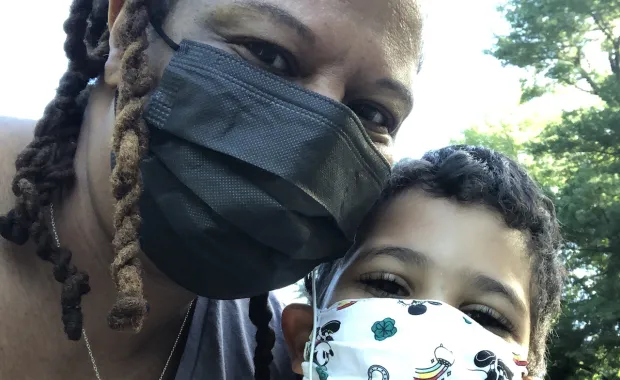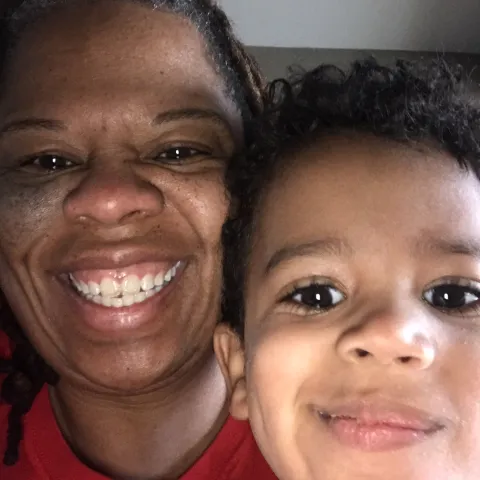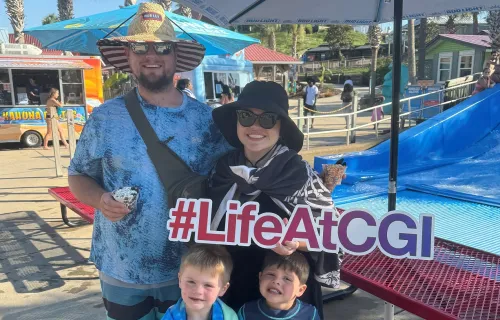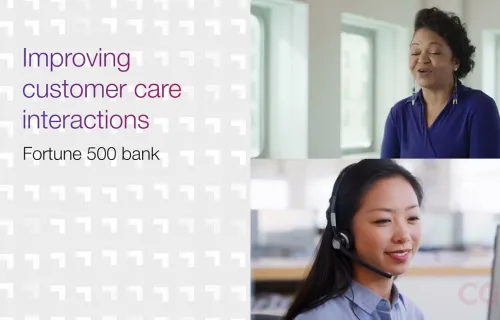I have worked for CGI for a total of 16 years, with a break in between. I’ve found it to be a supportive, collaborative place, with people who take their commitments to clients, and to each other, seriously, says Nikki Rosen, a Director of Consulting Services in Fairfax, Virginia.
I started my career here when it was still American Management Systems (AMS). I had heard it was good employer, so I applied for a position. I worked here for nine years and then moved on to other opportunities, for about an equal amount of time, I returned in 2015. I credit my mother for nudging to make the decision; she kept telling me I should go ‘where people know’ me.
CGI appeals to me because of the relationships that you can build and maintain. I'm part of the Momentum community, which is a small universe, especially locally. You always come across people you know. I'm a firm believer in your reputation following you from place to place, so I like the idea of establishing a reputation within the community. When I encounter people I knew 15 or 20 years ago, they remember me by the reputation I built with them, previously.
I like to think they know me for my intelligence, transparency and trustworthiness. I often say things that are difficult to hear, but are never not true. If a customer realizes that I told them exactly what was happening with a challenge or a problem and a plan to resolve it, it builds trust- even if they aren’t particularly happy with us. Later, if another troublesome situation arises, they'll more readily accept what we propose and agree on a path forward because we have built that trust and relationship.
We all like to feel that people are hearing us, and frankly, I don't know that I always feel heard here. However, I'm certainly always willing to speak up. That can make people uncomfortable, including me, but it’s important to say the words. Laboring under a cloak of ambiguity isn't healthy. Clarity is healthy, even if uncomfortable. Along those lines, information and being heard are also good things for both the member and the organization. I can talk a lot, but I still want to make sure I'm heard. I often seek that feedback loop, so that I know the person heard and understood my perspective. Sometimes that necessitates repetitive conversations, but I’m committed to having those repetitive conversations where necessary.
I feel empowered to articulate my feelings and opinions, but I don't always feel that I'm empowered or have the support to make the change I want to see. I think those two things are different. But the only thing I can do is to keep speaking and pushing. It wears on you, but a good cause is worth a little bit of tiredness on my part.
A culture of commitment
One thing I really like about CGI is that we don’t shy away from our commitments. We stick with our customers, we stick with our products and we stick with our people. We try to make difficult situations work. We keep working at it. For example, a few years ago we had a customer that was having challenges with disaster recovery (DR). We had never really been able to meet the metrics we had committed to. It was an ongoing thorn in their side and our leadership decided to provide a kind of solution that was different than what we had proposed. We assumed the expense to implement the change. The amount of money invested paled in comparison to the trust and overall satisfaction with customer that it built. Later the customer was willing to sole-source work to us, in part because we had turned around a challenge by making that small investment and closing our trust deficit.
The same commitment applies internally too. At CGI we’re members, not employees—to me that means partnership. It means that we're in it together, that everyone, no matter who they are, has value in the organization even if you don't fit a mold. We’re also owners. At the superficial level that refers to our stock purchase plan, but it also suggests investment in the future, an investment in the long term success of the organization.
I’ve heard people talk about bringing their whole self to work—that is, being able to express aspects of their personality or nature that might not always be comfortable, such as my Black, Asian, Latinx or LGBTQ+ colleagues. For me, I don’t know if it’s ever possible to bring my whole self to work. I’m a lot. I want to bring my whole self to work in that I want to be able to speak freely and not fear reprisal, but I do understand that my communication style might not always land well on everyone. I try to make adjustments accordingly to make sure that my message gets across.
Balancing work and the rest of my life
I have two sons, ages 8 and 5. I’m discovering day by day that my five-year-old is 100% like me, so I'm getting the outside Nikki experience from him. He's extremely tenacious; he holds you to your word, which makes me value even more my ability to keep my word and keep my commitments. Because of him, I’m not just being held accountable at work. Right now they tell me I promised them a wrestling match that I haven’t delivered on yet. I have to find some way to keep that promise, without injuries.
The boys keep things very interesting. I like the weekend version of us more than the weekday version. The go-to is to play games (board, video, cards), sometimes we watch movies together and on occasion, when the weather is good, time at the park. And maybe one day soon, wrestling.
DE&I
I’m on the board of CGI’s Black Member Alliance, and I’m the team leader for its Monitoring and Accountability Team. The team name is self-explanatory an eye on the progress around diversity, equity and inclusion (DE&I), and the advancement, retention and promotion of Black members. We’re the only member resource group (MRG) with this particular team. I had assumed that all of the MRGs had them, but apparently we’re unique. What I decided to take from that is that if we can improve outcomes for Black members, we can improve outcomes for all members.
As a Black woman working in technology, I do sometimes run into the feeling of not belonging. My maiden name was a more common name, and my married name is a traditionally Jewish name, so there are times when I meet people in person for the first time who might have known me before only through phone calls, and I get looks of surprise. Friends have told me that I must have changed my name just for the comedy. The look isn’t a bad thing, because the person with the expression quickly registers the assumptions they’ve made.
As a Black professional with a Jewish last name, it seems that sometimes people take me more seriously, with more credibility, if they know me only by voice. It might be just faintly perceptible or as plain as the nose on anybody's face, but that's been my experience at different points over the past decade. I once had a colleague walk into a meeting room (for a meeting I’d scheduled) and upon seeing me sitting there, informed me that a meeting was about to start. He ended up with one of those looks I mentioned.
CGI isn’t a perfect place to work—no place is. Building a culture of belonging is a two-way street. Members have to articulate what we need. Then, leaders have to hear and take action; and not get caught in their own comfort or reluctance to have difficult conversations. In leadership – we have to do the whole job. That goes for inclusion, for empowerment, for work-life balance and for satisfaction in your workplace.
Read more CGI member stories in the Life at CGI blog series.
Want to join us? Find your next opportunity at CGI Careers or join our talent network.






